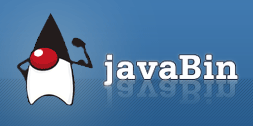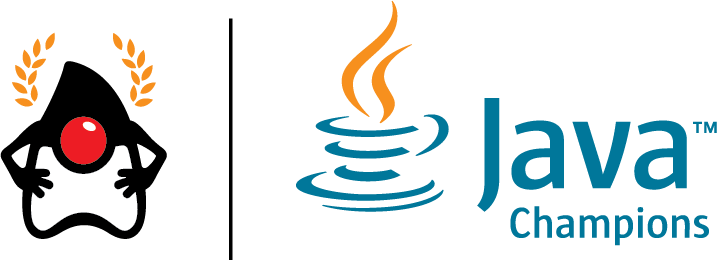
Java & Haskell
Similarities and Differences
Dervis Mansuroglu - @dervis_m


Developer & Competency Manager
Norwegian JUG javaBin, Oslo Organizer

Who am I and why listen to me?

Oslo Software Architecture Co-Organizer
Java Champion

This talk is not about:
Monads
Higher kinded types
Function composition
Category theory
Functors
A Brief Summary
Key takeaways
Java
- Imparative / object oriented
- Compiles to bytecode
- Statically typed
- Strict (applicative order)
- Mutable
- Garbage collected
- Garbage-First GC (G1)
- JIT compilation
- AOT possible with GraalVM
- Notable people:
James Gosling, Brian Goetz, Mark Reinhold, + many more
Haskell
- Declarative / purely functional
- Compiles to native binary
- Strongly typed
- Lazy (normal order)
- Immutable
- Garbage collected
- Parallel Gen. Copying GC
- Language can be extended
- AOT compilation
- Notable people:
John Hughes, Lennart Augustsson (Chalmers Uni), Philip L. Wadler
Java is about clear, readable and reliable code.
Writing as less code as possible is not a goal itself for the Java programming language.

Make it easier to build and maintain reliable code ... that's why people continue to use and trust Java.
- Brian Goezt
Java adopts concepts from functional languages.
JEP-359 Records
JEP-360 Sealed Types
JEP-169 Value Types
JEP-305 Pattern Matching, instanceof
JEP-325 & 354 Switch Expressions

Strongly typed language with powerful type inference.
As other languages move towards functional style, Haskell get better tooling, libraries, stable releases, a growing community and increased industry adoption.

Extendible language that guarantees laziness and immutability.
Haskell is constructed by expressions, not statements. Side-effects and mutation is hard, but is still possible. Haskell has tens of extensions called pragmas, that can be enabled.

Compilation and Runtime Systems
Java src code
bytecode
machine code
JIT Compiler
Java Compiler
No optimization
JIT optimization
Haskell src code
Core code
machine code
STG code
HS Compiler
C - - code
C code
LLVM code
www.aosabook.org/en/ghc.html
Low-level imperative language.
Optimisation
Parsing
Code-generation
The JVM - Java Runtime System
Classloader
Java Class file
(Java Bytecode)
Execution
Engine
Native Method
Interface / Libraries
Heap
Stacks
Registers
Methods
RTS - Haskell Runtime System
STG-Program Code (machine code)
STG-machine
Executable binary file
Registers
Heap
Stacks
GHC Libraries
Haskell
Execution Context
(HEC)
Heap
Registers
Java
Haskell
*.java
JVM
*.hs
GHC
RTS
Important differences
Immutability
Haskell guarantees purity.
("dirty" code is handled in IO-monads)
We need impure code to be able to run our programs, but:
Separate pure and impure code as much as you can!
main = do
putStrLn "Write a line: "
line <- getLine
putStrLn $ "Input was: " ++ line
-- impure
main = do
putStrLn "Write a line: "
line <- getLine
putStrLn $ (append line)
-- pure
append :: String -> String
append input = "Input was: " ++ inputappend is referentially transparent.
Sequencing (imperative style)
Lazy evaluation
Haskell guarantees laziness.
(aka delayed evaluation)
repl.it/@dervism/JavaLazyEval
Basic Types
Java
double, long, int, float, char, short, byte, boolean, String
Haskell
Int, Integer, Double, Float, Bool, Bits, Char, String
Primitives:
- Int#, Double#, Float#, Word#, Char#
Signed integrals:
- Int8, Int16, Int32, Int64
Haskell optimizes your code to use primitives (when possible).
Don't use Haskell's primitive types:
Int# causes eager evaluation!
Bits: Import Data.Bits, GHC.Prim + enable MagicHash extension.
Java
int[] ints = new ints[6];
Haskell
ints = array (0, 5) [(i, 0) | i <- [0..5]]
ints[5] = 10;
ints // [(5,10)]
int val = ints[5];
val = (ints ! 5)
new ints[] {1, 2, 3};
array (0,2) [(0,1), (1,2), (2,3)]
new ints[] {1, 2, 3};
listArray (0,2) [i+1 | i <- [0..2]]
listArray ('a','h') [i | i <- [0..8]]
Map<Character, Integer>
Haskell arrays are lazy and immutable.
Haskell provides mutable arrays
Haskell arrays are extremely flexible with enums.
Import Data.Array
Algebraic Data Types
Aka ADT's
Sum type
This OR That.
Product type
This AND That
https://en.wikipedia.org/wiki/Tagged_union
Records, tuples, ADT (with one constructor), Java classes, C structs
https://en.wikipedia.org/wiki/Product_type
Java enums(*), ADTs (with several data constructors)
Also called: variant, choice type, discriminated union, disjoint union, coproduct
* cant extend with additional data
Java
Haskell
enum Animal {
DOG("Max"), CAT("Nala"),
ELK("Sam");
String name;
Animal(String name) {
this.name = name
}
}data Animal = Dog | Cat | Elkenum Animal {
DOG, CAT, ELK
}data Animal = Dog String
| Cat String
| Elk String
name (Dog n) = n
name (Cat n) = n
name (Elk n) = ndata Animal = Dog String
| Cat String Int
| Elk Int Double | Unknown
info (Dog s) = "Name = " ++ s
info (Cat s i) = s ++ show i ++ " years."
info (Elk _ d) = "Elk weight" ++ show d
info _ = "Unknown animal"Records
ADT's with named accessors
Project Amber
Java 14 - Records
enum AnimalType { Mammal, Bird, Fish }
record Animal(String name, int age, AnimalType type) {}
@Test
void propertiesEquals() {
var elephant = new Animal("Elephant", 10, Mammal);
assertEquals(elephant.name(), "Elephant");
assertEquals(elephant.age(), 10);
assertEquals(elephant.type(), Mammal);
}https://github.com/dervism/java14-demo
Haskell - Record type
data AnimalType = Mammal | Bird | Fish
deriving (Show)
data Animal = Animal {
name :: String,
age :: Int,
type :: AnimalType
}
instance Show Animal where
show (Animal a b c) = a ++ "," ++ show c
main = do
print $ (Animal "Elephant" 10 Mammal)
putStrLn $ name (Animal "Elephant" 10 Mammal)
-- Output: Elephant,Mammal
-- Output: Elephantrepl.it/@dervism/enumeration
ADT's in Java 8
https://chadaustin.me/2015/07/sum-types/
http://homepages.inf.ed.ac.uk/wadler/papers/expression/expression.txt
Sealed Types
A step closer to ADT's
Project Amber
Java
Haskell
sealed interface Node
permits A, B, C { ... }data Spec = Spec {
engineType :: Engine,
maxSpeed :: Speed,
featureList :: [Feature]
}
data Transport = Car Spec
| Bus Spec | Plane Spec
class Automobile a where
spec :: a -> Spec
instance Automobile Transport where
spec (Car s) = s
spec (Bus s) = s
spec (Plane s) = sInline classes
codes like a class, acts like an int
Project Valhalla
Java
Haskell
With the exception of mutable types (such as MVars/TVars), all of Haskell's data types are first-class values.
inline class Point {
private int x;
private int y;
public Point(int x, int y) {
this.x = x;
this.y = y;
}
public int x() { return x; }
public int y() { return y; }
}openjdk.java.net/jeps/169
cr.openjdk.java.net/~briangoetz/valhalla/sov/02-object-model.html
Modules, Classes & Methods
Java
Spaces and tabs are ignored.
Haskell
Indentation matters.
Braces and semicolons are required.
Braces and semicolons are optional.
Java
Haskell
public class MyClass {
public int add(int x, int y){
return x + y;
}
public String hello(){
return "Hello, world!";
}
}module MyClass where
add :: Int -> Int -> Int
add x y = x + y
hello :: String
hello = "Hello, world!"module MyClass where
add x y = x + y
hello = "Hello, world!"Java
Haskell
import java.lang.*;
import java.util.Map;
import static
java.util.Arrays.sort;
public class MyClass {
...
}import Prelude
import Data.Map
import qualified Data.Map as M
import Data.List (filter, sort)
import Data.List hiding (nub)
module MyClass where
...
Java 9+
Haskell
module com.testmodule {
requires module.name;
requires static module.name;
requires transitive module.name;
exports package.name;
export package.name to some.package;
opens com.package;
opens com.package to anotherModule;
}module ChessGame (
Result(..)
easy,
difficult,
run) where
run level = play level
easy = (Chess Normal)
difficult = (Chess Strong)
data Result = Won | Lost | Draw
data Ai = Normal | Strong
data Chess = Chess Ai
class Game a where
play :: a -> Result
instance Game Chess where
play chessAi = ....
module-info.java
Java
Haskell
public interface Person<A> {
String name(A a);
}class Person a where
name :: a -> StringJava
Haskell
interface Person<A> {
String name(A a);
}
class Teacher {
String tName;
int tAge;
public Teacher(String tName, int tAge) {
this.tName = tName;
this.tAge = tAge;
}
}
class TeacherInstance implements Person<Teacher> {
@Override
public String name(Teacher teacher) {
return "Hello to " + teacher.tName;
}
}
class Student implements Person<Student> {
String sName;
int sAge;
public Student(String sName, int sAge) {
this.sName = sName;
this.sAge = sAge;
}
@Override
public String name(Student student) { // low cohesion
return "Hello to " + student.sName;
}
}
class Main {
public static void main(String[] args) {
TeacherInstance teacherInstance = new TeacherInstance();
System.out.println(teacherInstance.name(new Teacher("Jane", 30)));
Student student = new Student("Peter", 30);
System.out.println(student.name(student)); // ???
}
}class Person a where
name :: a -> String
data Teacher = Teacher { tName :: String, tAge :: Int }
data Student = Student { sName :: String, sAge :: Int }
instance Person Teacher where
name teacher = "Hello to " ++ (tName teacher)
instance Person Student where
name student = "Hello to " ++ (sName student)
main = do
let teacher = name (Teacher "Jane" 30)
student = name (Student "Peter" 30)
putStrLn $ teacher ++ "\n" ++ student
repl.it/@dervism/JavaTypeclasses
repl.it/@dervism/typeclasses
interface Person {
String name();
}
class Teacher {
String tName;
int tAge;
public Teacher(String tName, int tAge) {
this.tName = tName;
this.tAge = tAge;
}
}
class TeacherInstance implements Person {
private Teacher teacher;
public TeacherInstance(Teacher teacher) {
this.teacher = teacher;
}
@Override
public String name() {
return "Hello to " + teacher.tName;
}
}
class Student implements Person {
String sName;
int sAge;
public Student(String sName, int sAge) {
this.sName = sName;
this.sAge = sAge;
}
@Override
public String name() {
return "Hello to " + this.sName;
}
}
class Main {
public static void main(String[] args) {
TeacherInstance teacherInstance = new TeacherInstance(new Teacher("Jane", 30));
System.out.println(teacherInstance.name());
Student student = new Student("Peter", 30);
System.out.println(student.name());
}
}Control Structures
data Person = Person {
salary :: Int,
taxClass :: TaxClass
}Java
Haskell
if (salary > 900)
tax = salary * 0.44;
else
tax = salary * 0.36;if salary > 900
then salary * 0.44
else salary * 0.36if (salary > 900)
return salary * 0.44;
else if (salary > 500)
return salary * 0.36;
else
return salary * 0.24;if salary > 900
then salary * 0.44
else if salary > 500
then salary * 0.36
else salary * 0.24If-Then-Else
Haskell Guards (1)
if salary > 900
then salary * 0.44
else if salary > 500
then salary * 0.36
else salary * 0.24tax salary
| salary > 900 = salary * 0.44
| salary > 500 = salary * 0.36
| otherwise = salary * 0.24Haskell Guards (2)
tax salary
| salary > 900 = salary * 0.44
| salary > 500 = salary * 0.36
| otherwise = salary * 0.24tax salary = salary * taxClass
where taxClass
| salary > 900 = 0.44
| salary > 500 = 0.36
| otherwise = 0.24Java, up to v.11
Haskell
switch (taxClass) {
case CLASS_1:
return 0.44;
case CLASS_2:
return 0.36;
}case taxClass of
CLASS_1 -> 0.44
CLASS_2 -> 0.36switch (taxClass) {
case CLASS_1:
tax = 0.44;
break;
case CLASS_2:
tax = 0.36;
break;
}Switch-Case
Java 13 (Project Amber)
Haskell
enum Letter {A, B, C, D};
public String getLetter(Letter letter) {
return switch (letter) {
case A, B, C, D -> "A letter";
default -> "Unknown";
};
}
data Letter = A | B | C | D deriving (Enum, Eq)
letter :: Letter -> String
letter letter
| elem letter [A ..] = "A letter"
| otherwise = "Unknown"Functional Programming
Why hasn't Haskell
taken over the world?
Object Orientation
Algol60, Simula, C/C++, Unix
Marketing
$xxxM campaign




Tooling
Java is one of the best supported technologies.
Performance
The JVM is amazing!
-
HotSpot compiler is extremely good
-
The JVM has better, or equal performance
Time-To-Production
High learning curve.
Community
#Java
Haskell on the JVM
Two alternatives exits
Frege

ETA-Lang

@dervis_m
dervis.no
Thanks!
https://github.com/dervism
https://repl.it/@dervism
http://bit.ly/jfokus2020dm